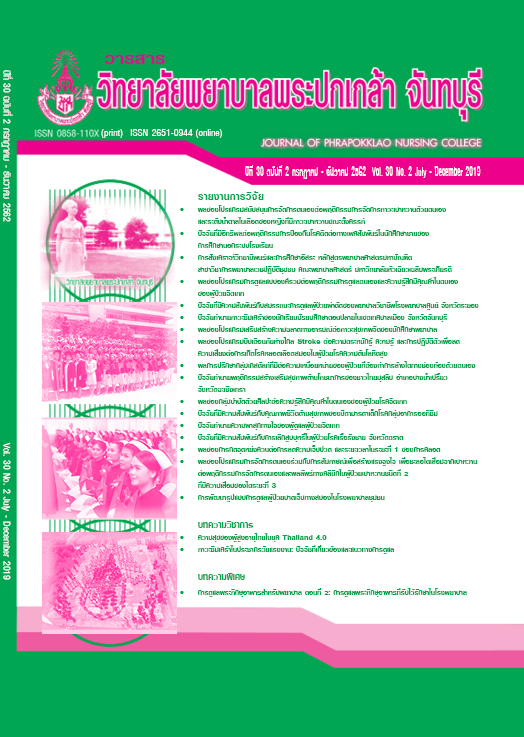Factors Predicting Psychological Well-being among Caregivers of Patients with Schizophrenia
Keywords:
Caregiver of patient with schizophrenia, Psychological well-being, Caregiver burden, HopeAbstract
This predictive correlational research aimed to investigate the psychological well-being and its predicting factors among caregivers of patients with schizophrenia. The samples consisted of 120 caregivers of patients with schizophrenia who took the patients for treatment at Sakaeo Rajanagarindra Psychiatric Hospital. The research instruments included a personal information questionnaire, a perceived self-efficacy in caring for schizophrenic patient questionnaire with the reliability of .95, a caregiver burden questionnaire with the reliability of .88, a hope questionnaire with the reliability of .81, a social support questionnaire with the reliability of .89, and a psychological well-being questionnaire with the reliability of .86. Data were collected from April to June, 2017. Statistics used for data analysis included frequency, percentage, mean, standard deviation, Pearson’s product moment correlation coefficient, and stepwise multiple regression.
The research results revealed that the overall mean score of psychological well-being among caregivers of patients with schizophrenia was at a moderate level (M = 71.74, SD = 9.27). Caregiver burden and hope together could statistically significant explain 27% of variance for psychological well-being (R2 = .270, p < .001). The most significant predicting factor was caregiver burden (Beta = -.334, p < .001) followed by hope (Beta = .266, p < .01).
This research suggests that health care providers should apply these research results for designing interventions to promote the psychological well-being of caregivers of patients with schizophrenia by reducing caregiver burden and enhancing their hope.
References
กรมสุขภาพจิต. (2556). รายงานประจำปี กรมสุขภาพจิต ปีงบประมาณ 2556. นนทบุรี: ผู้แต่ง.
กรมสุขภาพจิต. (2559). สถิติผู้ป่วยที่มารับบริการโรงพยาบาลสังกัดกรมสุขภาพจิต. นนทบุรี: ผู้แต่ง.
แก้วตา มีศรี, และเพ็ญนภา แดงด้อมยุทธ์. (2555). ปัจจัยที่มีความสัมพันธ์กับความสามารถของผู้ดูแลผู้ป่วยจิตเภทในชุมชน. วารสารสุขภาพจิตแห่งประเทศไทย, 26(1), 35-49.
นพรัตน์ ไชยชำนิ. (2544). ผลของการใช้โปรแกรมการดูแลผู้ดูแลแบบองค์รวม ต่อภาระและความสามารถในการดูแลผู้ป่วยจิตเภท (วิทยานิพนธ์ปริญญามหาบัณฑิต). กรุงเทพฯ: จุฬาลงกรณ์มหาวิทยาลัย.
นพวรรณ เอกสุวีรพงษ์, และนารัต เกษตรทัต. (2550). ปัจจัยที่มีผลต่อความไม่ร่วมมือในการใช้ยาของผู้ป่วยจิตเภท ณ โรงพยาบาลสวนสราญรมย์. วารสารสมาคมจิตแพทย์แห่งประเทศไทย, 52(4), 412-218.
นัทธมนต์ ฉิมสุข, และเพ็ญนภา แดงด้อมยุทธ์. (2557). ปัจจัยคัดสรรที่มีความสัมพันธ์ต่อภาวะความกดดันด้านจิตใจของผู้ดูแลผู้ป่วยจิตเภท (วิทยานิพนธ์ปริญญามหาบัณฑิต). กรุงเทพฯ: จุฬาลงกรณ์มหาวิทยาลัย.
ประภาศรี ทุ่งมีผล. (2548). การสนับสนุนทางสังคม ความพร้อมในการดูแล และความเครียดของมารดาเด็กออทิสติก (วิทยานิพนธ์ปริญญามหาบัณฑิต). มหาวิทยาลัยเชียงใหม่.
พัสตราภรณ์ พงษ์สิทธิศักดิ์. (2546). ความสัมพันธ์ระหว่างปัจจัยส่วนบุคคล ภาระเชิงปรนัยในการดูแล ความเข้มแข็งของครอบครัว ความหวัง กับความผาสุกทางใจของผู้ดูแลในครอบครัวผู้ป่วยจิตเภท โรงพยาบาลจิตเวชขอนแก่นราชนครินทร์ (วิทยานิพนธ์ปริญญามหาบัณฑิต). กรุงเทพฯ: จุฬาลงกรณ์มหาวิทยาลัย.
พิศมัย สิโรตมรัตน์. (2553). ความว้าเหว่ การรับรู้ความสามารถของตนเอง การสนับสนุนทางสังคม และความผาสุกทางใจของผู้สูงอายุ อำเภอเมือง จังหวัดนนทบุรี (วิทยานิพนธ์ปริญญามหาบัณฑิต). กรุงเทพฯ: มหาวิทยาลัยเกษตรศาสตร์.
ภัทราภรณ์ ทุ่งปันคำ. (2556). การดูแลผู้ที่เป็นโรคจิตเวชที่บ้าน. สำนักวิชาพยาบาลศาสตร์ มหาวิทยาลัยเชียงใหม่.
มยุรี กลับวงษ์, ผจงจิต อินทสุวรรณ, วิลาสลักษณ์ ชัววัลลี, และนันทิกา ทวิชาชาติ. (2552). ปัจจัยที่มีอิทธิพลต่อความเหนื่อยหน่ายและพฤติกรรมการดูแลผู้ป่วยโรคจิตเภทของผู้ดูแล. วารสารพฤติกรรมศาสตร์, 15(1), 57-75.
มาโนช หล่อตระกูล, และปราโมทย์ สุคนิชย์. (บ.ก.). (2558). จิตเวชศาสตร์ รามาธิบดี (พิมพ์ครั้งที่ 4). กรุงเทพฯ: ภาควิชาจิตเวชศาสตร์ คณะแพทยศาสตร์โรงพยาบาลรามาธิบดี มหาวิทยาลัยมหิดล.
รักสุดา กิจอรุณชัย. (2555). ผลของสุขภาพจิตศึกษาต่อการกลับมารักษาซ้ำของผู้ป่วยจิตเภท. วารสารสุขภาพจิตแห่งประเทศไทย, 20(3), 154-162.
เรณูการ์ ทองคำรอด. (2541). ความหวังของผู้ติดเชื้อเอชไอวี (วิทยานิพนธ์ปริญญามหาบัณฑิต). มหาวิทยาลัยเชียงใหม่.
โรงพยาบาลจิตเวชสระแก้วราชนครินทร์. (2559). รายงานประจำปี โรงพยาบาลจิตเวชสระแก้วราชนครินทร์ ปีงบประมาณ 2558. สระแก้ว: ผู้แต่ง.
สมจิต หนุเจริญกุล, ประคอง อินทรสมบัติ, และพรรณวดี พุธวัฒนะ. (2532). สิ่งรบกวนในชีวิตประจำวัน ความเข้มแข็งในการมองโลก และการรับรู้ถึงความผาสุกในชีวิตของอาจารย์พยาบาลในมหาวิทยาลัย. วารสารการพยาบาล, 38(3), 169-190.
สายใจ พัวพันธ์. (2553). การรับรู้ถึงการเป็นภาระของผู้ดูแลผู้ป่วยจิตเภทในเขตจังหวัดชลบุรี. วารสารการพยาบาลจิตเวชและสุขภาพจิต, 24(1), 156-158.
สุนันทา นวลเจริญ. (2553). ผลของโปรแกรมการส่งเสริมการรับรู้สมรรถนะแห่งตนต่อความสามารถในการดูแลบุคคลที่พึ่งพาของผู้ดูแลผู้ป่วยโรคจิตเภท (วิทยานิพนธ์ปริญญามหาบัณฑิต). กรุงเทพฯ: จุฬาลงกรณ์มหาวิทยาลัย.
อรินทร์ จรูญสิทธิ์. (2554). ปัจจัยที่มีความสัมพันธ์กับความผาสุกของญาติผู้ดูแลผู้ป่วยโรคหลอดเลือดสมอง (วิทยานิพนธ์ปริญญามหาบัณฑิต). ชลบุรี: มหาวิทยาลัยบูรพา.
Adamec, C. (1996). How to live with mentally ill person. New York: John Wiley & Sons.
Bandura, A. (1997). Self efficacy: The exercise of control. New York: W. H. Freeman.
Brandt, P. A., & Weinert, C. (1985). PRQ: Psychometric update. School of Nursing, University of Washington.
Doornbos, M. M. (2002). Family caregivers and the mental health care system: Reality and dreams. Archives of Psychiatric Nursing, 16(1), 39-46.
Dupuy, H. J. (1977). The general well-being schedule. In F. McDowell & C. Newell (Eds.), A measuring health: A guide to rating scales and questionnaires (p. 125). New York: Oxford University Press.
Eakes, G. G. (1995). Chronic sorrow: The lived experience of parents of chronically mentally ill individuals. Archives of Psychiatric Nursing, 9(2), 77-84.
Ferriter, M., & Huband, N. (2003). Experiences of parents with a son or daughter suffering from schizophrenia. Journal of Psychiatric and Mental Health Nursing, 10(5), 552-560.
Gupta, A., Solanki, R. K., Koolwal, G. D., & Gehlot, S. (2015). Psychological well-being and burden in caregivers of patients with schizophrenia. International Journal of Medical Science and Public Health, 4(1), 70-76.
Herth, K. (1992). Abbreviated instrument to measure hope: Development and psychometric evaluation. Journal of Advanced Nursing, 17(10), 1251-1259.
Loukissa, D. A. (1995). Family burden in chronic mental illness: A review of research studies. Journal of Advanced Nursing, 21(2), 248-255.
Tabachnick, B. G., & Fidell, L. S. (2007). Using multivariate statistics (5th ed.). Boston, MA: Pearson Education.
von Kardorff, E., Soltaninejad, A., Kamali, M., & Eslami Shahrbabaki, M. (2016). Family caregiver burden in mental illnesses: The case of affective disorders and schizophrenia - a qualitative exploratory study. Nordic Journal of Psychiatry, 70(4), 248-254.
World Health Organization. (2013). Schizophrenia. Retrieved from https://www.who.int/mental_health/management/schizophrenia/en/
Downloads
Published
How to Cite
Issue
Section
License
Copyright (c) 2019 JOURNAL OF PHRAPOKKLAO NURSING COLLEGE

This work is licensed under a Creative Commons Attribution-NonCommercial-NoDerivatives 4.0 International License.
เนื้อความ ข้อมูล และรายการอ้างอิงที่ผู้เขียนใช้ในการเขียนบทความเพื่อลงตีพิมพ์ในวารสารวิทยาลัยพยาบาลพระปกเกล้า จันทบุรี ถือเป็นความคิดเห็นและความรับผิดชอบของผู้เขียน คณะผู้จัดทำวารสารไม่จำเป็นต้องเห็นพ้องด้วยหรือร่วมรับผิดชอบ
บทความที่ได้รับการลงตีพิมพ์ในวารสารวิทยาลัยพยาบาลพระปกเกล้า จันทบุรี ถือเป็นลิขสิทธิ์ของวารสารวิทยาลัยพยาบาลพระปกเกล้า จันทบุรี หากหน่วยงานหรือบุคคลใดต้องการนำส่วนหนึ่งหรือทั้งหมดของบทความไปเผยแพร่ต่อเพื่อวัตถุประสงค์ใด ๆ จะต้องได้รับอนุญาตจากบรรณาธิการวารสารก่อน



